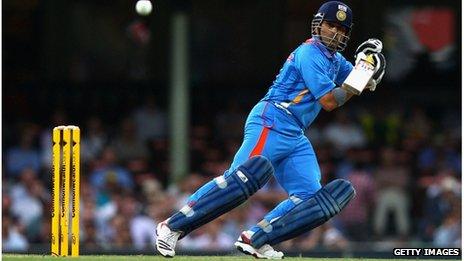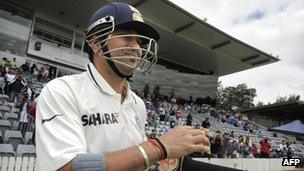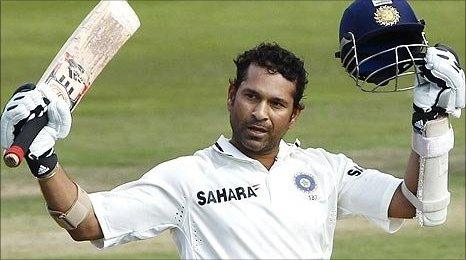A fan's paean to Sachin Tendulkar
- Published
- comments

Tendulkar is an Indian icon
The "ridiculous thing", as an English cricket writer described Sachin Tendulkar's quest for his 100th international century, took a long time coming - in fact the longest since the time taken between his first hundred in 1990, and his second, 511 days later.
It also appeared to wear him - and his fans - out. The wait, as Mike Atherton said, had not "only become tiresome, as it shone a harsh light on Sachin himself and what is motivating him to continue". In the run up to his newest record, Tendulkar's batting reminded Atherton of a "novice learning the ropes rather than someone who has learnt them better than virtually everyone in history".
Artherton is exaggerating. Tendulkar's unending feats have a sense of deja vu about them. So it is once again time to join the celebrations, and sing a paean to a man about whom there isn't much left to be sung.
With the hundredth international hundred now under his belt, Tendulkar, external holds just about every batting record worth having in the game.
The numbers are simply mind-boggling: 22 years at the crease, over 630 Tests and one-day games around the world, 33,000 plus runs, highest number of centuries in both formats of the game. The ferociously talented batsman is also the leading scorer of Test runs, and had 16 centuries before he turned 25. A giddy fan can go on and on.
Of course, critics believe that the god of cricket is fallible.
Many say Tendulkar doesn't dominate a match and dictate its outcome as, say, Vivian Richards, external and Brian Lara , externaldid. Others say his record against arch rival Pakistan has been underwhelming, compared to, say, the swashbuckling Virender Sehwag, external.
Then there is Tendulkar's insipid record as a leader - he won 16% and lost 36% of the 25 Tests he captained with what was one of the strongest Indian sides. His record as a one-day captain (35% wins) is way below that of Saurav Ganguly, external (53% wins) and Mohammad Azharuddin, external (54% wins). Only 20 of Tendulkar's 50 Test centuries have led to victories for his team.
'Just happens'
But all this, in the end, are minor quibbles, fans say. "No one", wrote Peter Roebuck, external, one of the greatest cricket writers, "has played more breathtaking innings in the highest company, or scored more runs, or given more pleasure." The age and occasionally the game itself, Roebuck said, has belonged to him.
Tendulkar is an unusual superstar in a celebrity-addled world. After scaling peaks which no other batsman had climbed, the diminutive guru of a glorious game retains a disarming child-like quality and a self-effacing demeanour. "Had JM Barrie needed a cricketer for Neverland," writer Mukul Kesavan, external wrote once, "he might have dreamt up Sachin Tendulkar."

Tendulkar had a patchy record as captain
How does he do it? I had wondered last February, after he had fired one-day cricket's first double hundred, external two months short of his 37th birthday. Answers to such questions are usually elusive. I had more banal questions.
How has the game still not become an ordeal for him? How does he retain his appetite for the game after all he has achieved and nothing more can be asked of him? Trawling through his old interviews recently, I found some clues. "So long as I love playing the game, so long as I enjoy the sound of bat hitting ball, I'm going to do it. I don't have to force myself - it just happens," Tendulkar told an interviewer in 2006.
It just happens. It just happens while carrying the expectations of a billion moody fans, among other things. But this steely player isn't a buccaneer on field. Tendulkar is one of the most elegant players to have blessed the game. He's armed with razor sharp anticipation, perfect balance and a poise of stroke-making that makes batting looks ridiculously easy.
Tendulkar also dominates the game totally as the greatest sportsmen do. He's at once intensely Indian and global, a lodestar of the country's rising aspirations. "He is a modern man playing a modern game in a modern style in the modern world - and that's what makes him of supreme importance to his fellow Indians," wrote the inimitable Mark Marqusee. "He's a homegrown genius, external excelling in a global game, a world-beater bred in the heart of Mumbai's status-hungry middle class."
What next? Should Tendulkar now lay down his willow and ride into the sunset? Some say though his mind is sharp, his body - and reflexes - have grown slower. Or will runs just keep happening? Tendulkar is a national obsession in a country where cricket is the opium of the masses. When Tendulkar stops playing what will India get high on?
- Published22 December 2010
